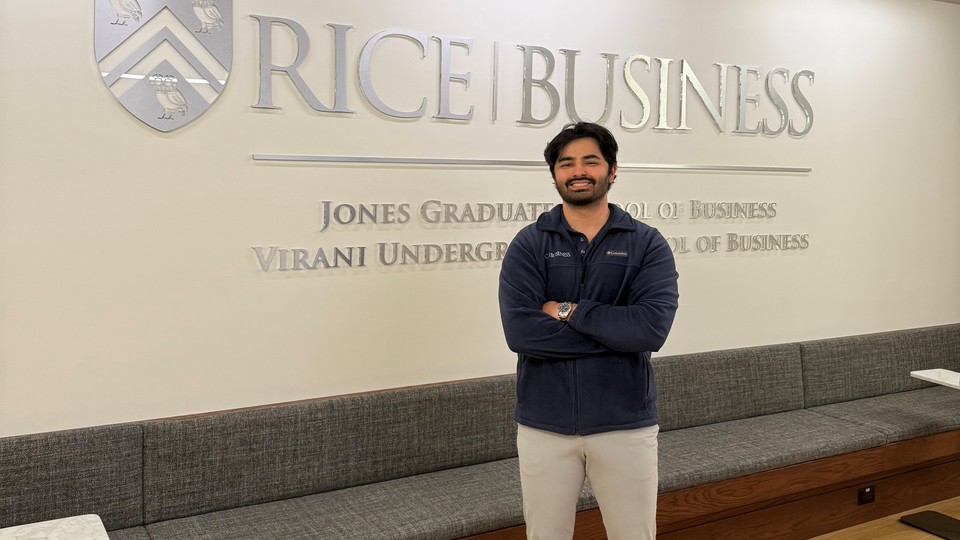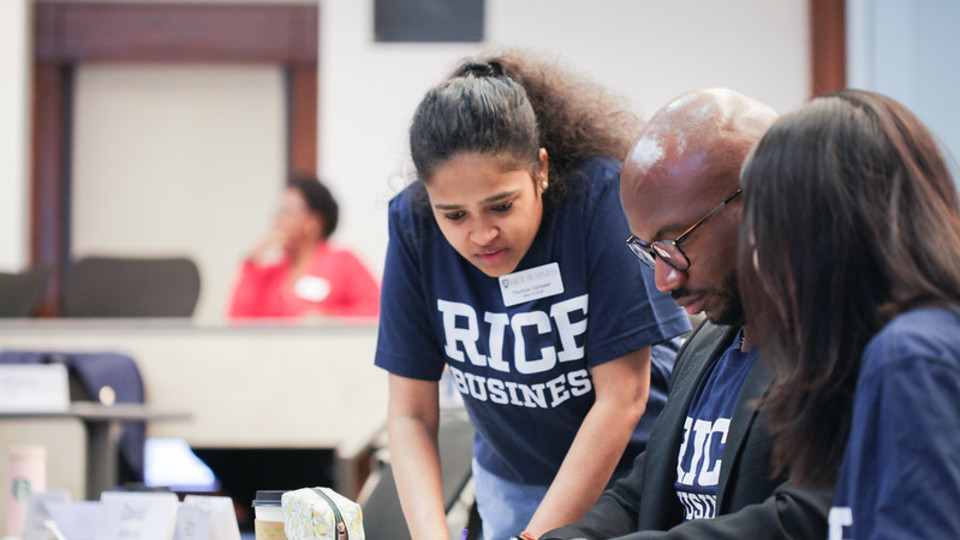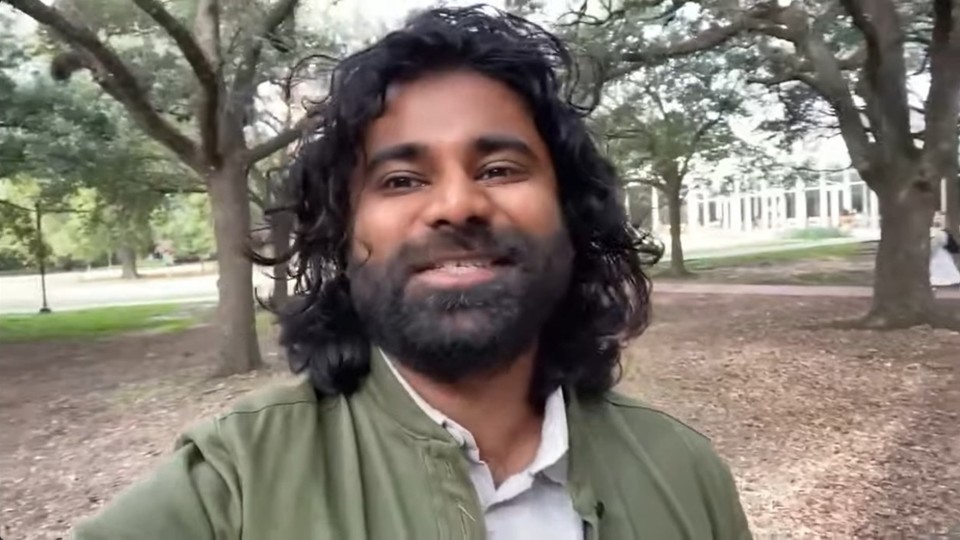Striving for More
Adrienne Mangual, Executive MBA '19
“Three things happened. I decided I wanted to do something else, but I wasn’t sure what. When I started looking, a lot of roles preferred an MBA, and I didn’t want that to be a reason I wasn’t considered for a job. Finally, Dean Rodriguez had been my professor at A&M. He was my mentor, encouraged me to pursue investment banking and helped me get an internship with JP Morgan, which led to a full-time job. When I heard that he was going to be the new dean, I thought maybe the time was right to think about going back to get my MBA.”
The daughter of Mexican immigrants, Adrienne Mangual grew up in Lufkin, Texas, was the first in her family to graduate from college and this spring will be the first in her immediate family to earn a graduate degree. Following a 10-year career in investment banking and a five- year career in corporate finance at an oilfield service company, she knew she wanted to do something more when she applied for the EMBA program. She left her job as assistant treasurer and started the EMBA program just before Hurricane Harvey. With a four-year-old and a one-year-old at home, she decided to spend the first year of her transition at home with her kids. The following year she cast a wide net in search for her next role with a focus outside of traditional finance roles. Adrienne is now executive director of strategy and planning for Prime Communications, the largest AT&T authorized retailer in the U.S. In her role, reporting to the CEO and founder, she leads various strategic projects for the company.
Keep Exploring
Filling in the Gaps
Fareen Elias, Full-Time MBA '19

“At Rice, once you apply, you’re already considered for a scholarship. The application process is so arduous. You really put yourself out there. Rice could see my value. It meant a lot to me get the recognition and receive the Crownover Scholarship.”
When Fareen Elias was in high school she came to Rice with Management Leaders of Tomorrow (MLT). She heard a presentation about how 10 major problems in the world could be solved by energy. “I realized I wanted to help solve those problems.” So she went to Texas A&M, majored in geophysics and minored in math and economics. After five years as a support geophysicist at a subsurface imaging software company and witnessing industry joint ventures, consolidations and software developer acquisitions, Fareen became interested in how companies were bought, sold and valued. “I wondered if I could take my operational experience and move to financial services and help energy companies create value.” Working in a startup environment, much of what she learned was self-taught. “I knew there were gaps.” The MBA was her next step. She was accepted at Rice and UT, but “Rice was the dream from the beginning.” And then she got a call that she was a nominee for the Crownover Scholarship. “It was so amazing. To go from the idea of sacrificing two years of income and paying for school, to hearing that you won the scholarship — I cried tears of joy. And Mr. Crownover is amazing. He really opens himself up and gives back to the students. I’m really excited for my next two years here.”
You May Also Like
Keep Exploring
Scholarships that Give Back
Trey Mattson, Full-Time MBA '18
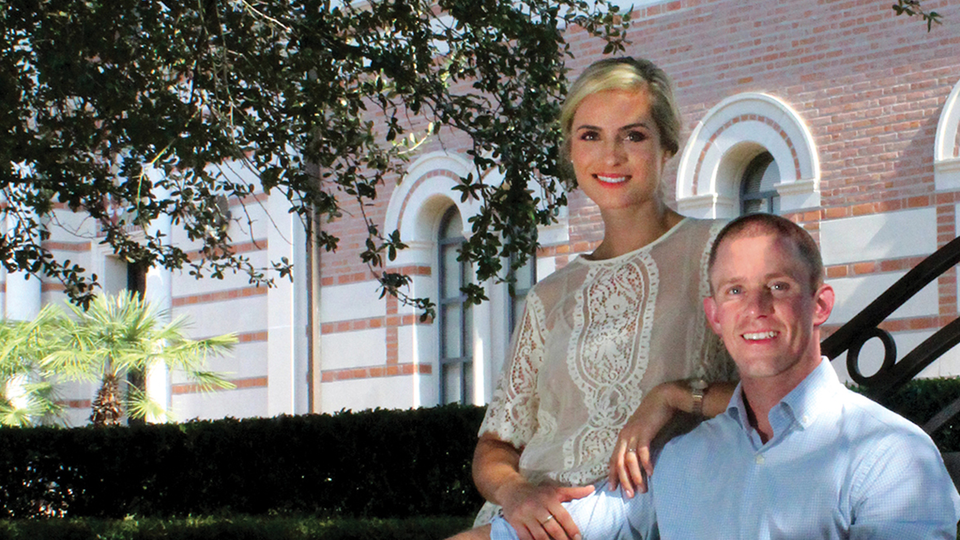
“The Jones Partners Scholarship is an engaged scholarship. You have to reciprocate by going to events, meeting with and reaching out to partners. Attending quarterly board meetings really gives you a behind-the-scenes perspective of the school. It’s been a unique and humbling experience to have received this scholarship.”
A native Houstonian, Trey Mattson chose Penn State for undergrad, just like his dad and two older brothers. He studied finance, met his wife, Kelly, and convinced her to move back to Houston with him so he could tap a career in the oil and gas sector. His first job with Tudor, Pickering, Holt & Co. jump-started his career in energy investment banking and eventually private equity. After five years with TPH, Trey started to think about an MBA, like his brothers, who told him it was the best decision they’d ever made. “I wanted a pause to reevaluate.” And though he looked at “fantastic options,” such as Harvard, Wharton, Stanford, Darden and MIT, the offer of the Jones Partners Scholarship sealed the deal at Rice. Jones Partners is a front facing organization that connects the business school and the Houston business community. Many of their members are alumni. Trey’s summer internship with White Deer Energy, a private equity fund, morphed into an offer for a full-time position after graduation. He will rejoin the firm next summer as a senior associate focused solely on oil and gas investments. He’s pictured here with his wife, Kelly; golden retriever, Cooper; and Rhodesian Ridgeback, Riley.
You May Also Like
Keep Exploring
Discovering New Possibilities
Chris Staffel, Executive MBA '17
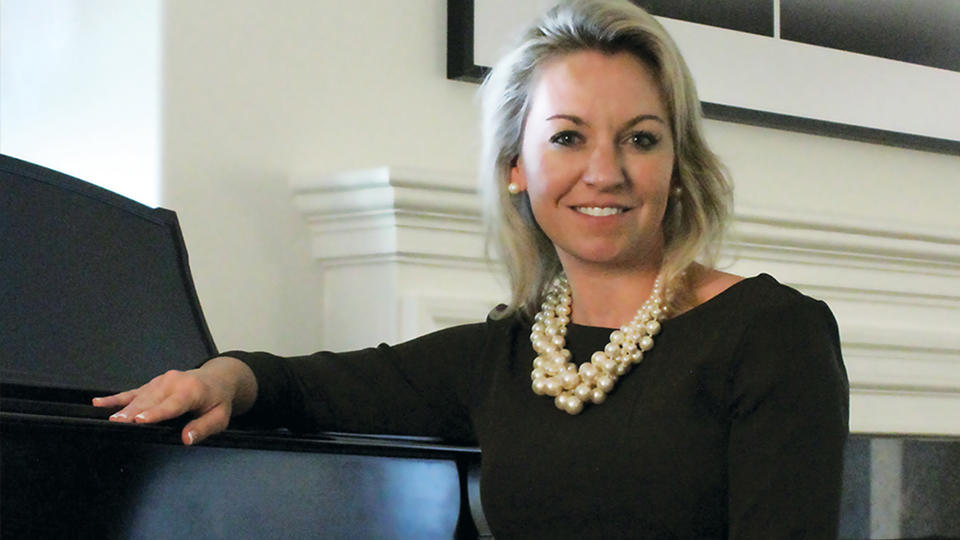
About Chris Staffel, Executive MBA '17
“If you would have told me years ago that I’d be building companies for natural gas pipeline infrastructure, I would have never believed you. I went to a music conservatory in Chicago for my undergraduate degree, followed by an M.F.A. in musical theater and then moved to New York to pursue musical theater … I’ve now started three companies in the midstream energy space.”

A native of San Antonio, Chris Staffel grew up thinking she wanted to be a professional singer. After mastering regional theater and a classical tour throughout Russia and Eastern Europe she got tired of living out of a suitcase and put down roots in New York City. The daily grind of auditions drove her to producing. “I realized I enjoyed the business part of it, equally, if not more than acting.” While she was producing The Dutchman she met two businessmen who were starting a midstream company. “What’s midstream?” she retells it now, laughing. As it turns out, acting and producing isn’t far off from starting and running a company. “You have to raise the capital, hire actors, market the show, and of course … perform.” Even before moving to Houston, she sat in on some classes at Rice and was sold on earning an MBA. “It’s been excellent. I’ve learned so much … The network is incredible.” Since the sale of her company in November, she’s curious about the next global opportunities on the horizon in energy and plans to travel to various emerging markets after graduation. “I want to see where the next possibilities are.”
Keep Exploring
High-Quality Peers
Ernie Mayfield, Executive MBA '18
“By far the highlight for me has been the interaction with my fellow classmates in the EMBA program. To be able to draw from the experience and knowledge base of such a high-quality group of working professionals at similar points in their careers is important to me.”
Lt. Col. Ernest G. Mayfield III flies F-16s out of Ellington Field about three times a week. As part of his job. A graduate of the U.S. Air Force Academy, he has completed more than 17 years as a fighter pilot in the Air Force, two tours in Iraq, and more than 350 hours of combat flying time in a wide range of global joint and multinational aviation missions. This past fall, after becoming director of operations at Ellington Field and keeping the Gulf Coast region safe, Ernie joined Rice Business to pursue an MBA. “I always wanted to get my MBA,” he said. “It was just a matter of when.” Ernie and his wife, Joy — who graduated from the EMBA program in 2006 and was his sister’s best friend growing up in Beaumont — are raising two daughters, age two and four. Despite a no-fail 24/7 homeland defense mission both at work and home, Ernie has loved going back to school. “I’m always excited for class weekends. I find the coursework interesting and relevant not only to today’s business environment but also my own sector in the Department of Defense.”
You May Also Like
Keep Exploring
Family Friendly
Nadia Bollinger, Professional MBA

“My choice to earn an MBA was very deliberate. I had to consider my family in the decision, and I needed a program that would complement my career. Reputation was important so I looked at a lot of programs. When I came to the Rice campus and met with admissions, I got the sense that this felt right. I wanted to have the full experience. I was sold.”

An IT supervisor at ExxonMobil, Nadia Bollinger has worked for the energy company 12 years — since she graduated from Texas A&M. She is used to going to school while working, having earned an M.S. in IT Project Management from UH, but that was before she married and had her daughter. Since then everything has changed and her priorities have shifted. “I want the best life for my family. An MBA made sense.” The self- described Pakistani-Canadian- American wants to be involved beyond the classroom, too. She’s got her eye on the finance club, NAWMBA and the Wright Fund. No matter how she gets involved over the next two years, she says, “I feel like I’m at the right place at the right time.”
You May Also Like
Keep Exploring
Rewarding Experiences
Joey Ammouri, Professional MBA '17
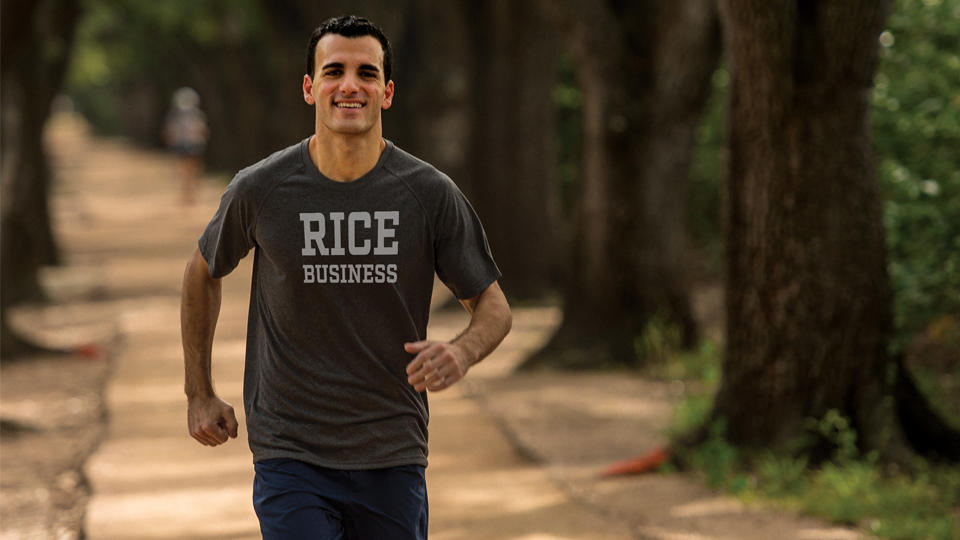
Joey Ammouri, Professional MBA '17
“Rice Business Board Fellows was one of the main reasons I chose to attend Rice. I remember thinking what a unique and amazing opportunity it would be to help further a cause I care about. As Board Fellows president, it has been a truly heartwarming and rewarding experience to share my vision, and expand the school’s reach to serve more nonprofits.”

As a child of immigrants from Nazareth, Joey Ammouri carries with him their drive for success, and selfless passion for giving back and being involved in the community. Along with his position as industrial sales manager at GE, busy social and travel schedule, and passion for running and fitness, Joey is also heavily involved with Big Brothers Big Sisters. He naturally found Rice Business Board Fellows to be the perfect fit when he started business school. Joey was placed with the Positive Coaching Alliance, which partners with youth sports organizations to help kids become “Better Athletes, Better People.” As Board Fellows president, he hopes it will be for others what it’s been for him — a prominent part of his graduate education.
Keep Exploring
Rice Jones Dean On Going STEM: Timing Was Almost ‘Perfectly Wrong’
All Rice University's graduate business programs are now certified as STEM, making Rice Jones the last top-25 U.S. B-school to have a STEM pathway.

Holding All The Cards
Why do some companies thrive in a volatile market?


Based on research by Gustavo Grullon, Evgeny Lyandres and Alexi Zhdanov
Why Do Some Companies Thrive In Volatile Markets?
- Conventional wisdom maintains that volatility tends to hinder overall returns.
- But rising volatility can actually improve firm value with a certain type of flexibility called “real options:” when managers have choices linked to tangible assets such as inventory, machinery, land or buildings, as opposed to financial instruments.
- Firms with real options thrive in uncertain situations because they have the flexibility to change their operations to amplify the effects of good news and dampen the effects of bad news.
Volatile markets look a lot like high-stakes poker games. Wild swings make it hard to chart a course to profitability, inevitably forcing some firms to fold. Yet there are always investors and firms that come out as big winners. So is there is a secret to drawing a winning hand in bad times?
Working with colleagues Evgeny Lyandres of Boston University and Alexei Zhdanov of Pennsylvania State University, Rice Business professor Gustavo Grullon hypothesized that the secret to surviving market volatility has to do with managers’ ability to adjust operations. The more flexibility managers must change the course of their firms, the reasoning went, the greater the likelihood of surviving market volatility — and in some cases profiting from it.
Consider Amazon, founded in 1994 with the goal of becoming “the world's most consumer-centric company, where customers can come to find anything they want to buy online.” From its start as a bookstore, the company turned into an ultra-diversified behemoth able to shrug off vast swings in the market. Despite high volatility in recent years, Amazon’s stock price increased roughly 39 percent, from $1,901 to $2,641, over the past year.
According to Grullon’s theory, having more real options — managerial choices about tangible assets such as inventory, machinery or buildings — boosts firm value in a whole range of volatile circumstances, whether demand-based, cost-based or profit-based. Firms that have these options — Amazon, for example — can act fast to mitigate bad news by changing operating and investment strategies. They might cut production, shutter operations or delay investments. Companies without these tools basically have to ride fate’s rollercoaster.
To test the theory, the researchers compared firms with a plethora of investment opportunities to those with more modest real options. They analyzed returns data from 1963 to 2018 from The Center for Research in Security Prices and from Compustat — a database of financial, statistical and market information about active and inactive U.S. companies. There is measurable value in having more real options, the researchers found. A bigger spread of real options allowed managers to change strategy as soon as new information arrived. The greater the number of real options, the greater the flexibility managers had at their disposal when the market got volatile.
Developing Amazon-type options and diversified assets, naturally, takes years of sweat, trial and a measure of luck. Companies that do best at creating such opportunities, the researchers note, tend to be highly sensitive to changes in volatility to begin with, leading to more opportunities to adapt. Overall, the team found, volatility-return relation was strongest in industries already characterized by plenty of growth and strategic options. High-tech firms, pharmaceutical companies and biotech companies, for example, show especially strong resistance to idiosyncratic volatility.
In other words, while volatile markets can resemble high-stakes poker, there are a few predictable rules. When the chips are down, companies that are lucky enough to hold diversified assets, have varied investment options and can shuffle resources quickly will be the strongest players at the table.
Gustavo Grullon is a professor of finance at Jones Graduate School of Business at Rice University.
To learn more, please see: Grullon, G., Lyandres, E. & Zhdanov, A. (2012). Real options, volatility, and stock returns. Journal of Finance, 67(4), 1499-1537.
Never Miss A Story
You May Also Like
Keep Exploring
Back to the Basics
Adam Saleh, Executive MBA '18
Adam Saleh '18 shares the reasons he chose Rice Business for his MBA.
